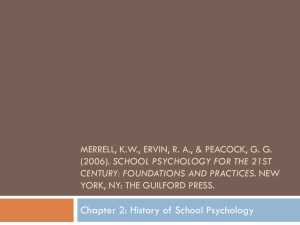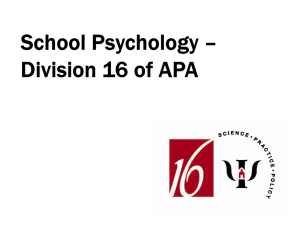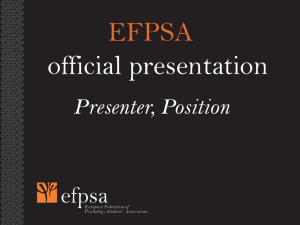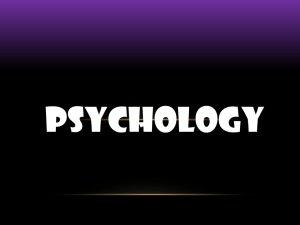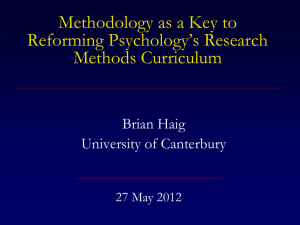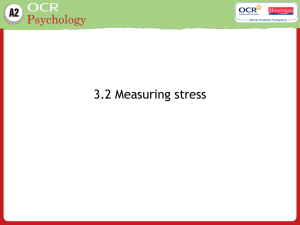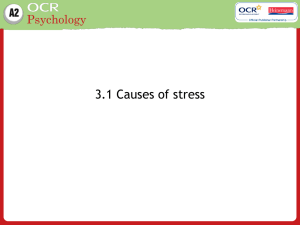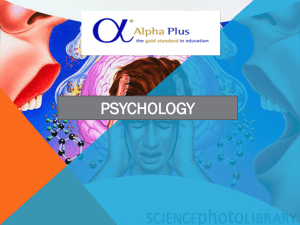What You Oughta Know About the AP Psychology Exam
advertisement
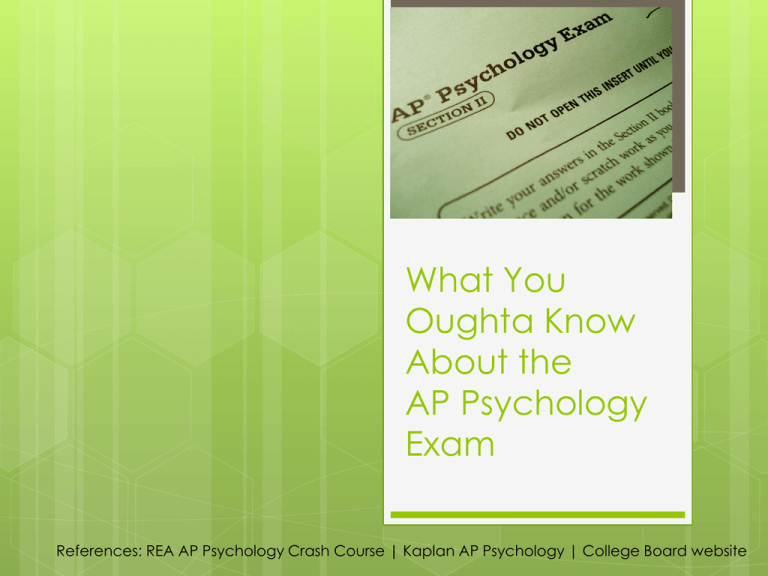
What You Oughta Know About the AP Psychology Exam References: REA AP Psychology Crash Course | Kaplan AP Psychology | College Board website AP Psychology Exam The Basics Date: Monday, May 7, 2012 Time: 12:00-2:30pm (the exam is 2 hours, plus time for instructions, distributing materials, and a break between sections I and II) Location: TBD - probably the Library & room 327… AP Psychology Exam What to Bring Several sharpened No. 2 pencils with erasers for all responses on your multiplechoice answer sheet (no mechanical pencils) Pens with black or dark blue ink for completing areas on the exam booklet covers and for free-response questions A watch (optional – there will be clocks in testing rooms) AP Psychology Exam What Not to Bring Electronics: cell phones, digital cameras, personal digital assistants (PDAs), BlackBerry smartphones, Bluetoothenabled devices, MP3 players, email/messaging devices, or any other electronic or communication devices. Books, compasses, mechanical pencils, correction fluid, dictionaries, highlighters, notes or colored pencils. Scratch paper; notes can be made on portions of the exam booklets. Watches that beep or have an alarm. Portable listening devices or portable recording devices (even with headphones) or photographic equipment. Computers. Clothing with subject-related information. Food or drink. AP Psychology Exam Structure of the Test Section 100 multiple choice questions 70 minutes 2/3 of your overall score (100 points) There is no guessing penalty, so answer every question! Section I II 2 free response questions 50 minutes 1/3 of your overall score (50 points) Focused on methodology across areas and relating a point to several different approaches in psychology AP Psychology Exam What Will Be On The Exam? (This chart is in your APP Syllabus) Unit 1 Unit 2 Unit 3 Unit 4 Unit 5 Unit 6 Unit 7 Unit 8 Unit 9 Unit 10 Unit 11 Unit 12 Unit 13 Unit 14 History and Approaches Methods and Approaches Biological Bases of Behavior Sensation and Perception States of Consciousness Learning Cognition Motivation and Emotion Developmental Psychology Personality Testing and Individual Differences Abnormal Psychology Treatment of Psychological Disorders Social Psychology 2-4% 6-8% 8-10% 7-9% 2-4% 7-9% 8-10% 7-9% 7-9% 6-8% 5-7% 7-9% 5-7% 7-9% AP Psychology Exam AP Exam Scores 5 = extremely well qualified 4 = well qualified 3 = qualified 2 = possibly qualified 1 = no recommendation approx. approx. approx. approx. approx. 75% 62% 51% 43% 0-42% Most colleges accept an AP score of 3 or higher to award college credit Percentages based on the 2007 Released Exam, AP Psychology Crash Course AP Psychology Exam Review Resources - print Average price: $18-35 Available at Barnes and Noble and…? AP Psychology Exam Review resources - online http://www.bremertonschools.org/Page/681 AP Psychology Exam Power Points: Units 1 -14 Edmodo.com Tag: Power Points www.edmodo.com (links to videos watched throughout the year are also posted on Edmodo) Ms. Justice’s Website – APP Page http://bremertonschools.org/Page/682 AP Psychology Exam Key Terms, Key Psychologists, and Key Theories Approximately 2/3 of the multiple choice questions test your knowledge of key terms – identify a definition or best example The remaining questions focus on key psychologists and their theories A list of 62 psychologists can be found in the AP Psychology Course Description on the College Board’s AP Psych webpage http://www.collegeboard.com/student/testing/ap/sub_psych.html AP Psychology Exam MC: Stand alone questions The majority of the MC questions are stand alone questions The words in the stem provide the info you need to answer the questions Covers a distinct topic Easy, medium, and hard (no order) Example A graphical representation of correlational data is called a: (a) Bell curve (b) Chi square (c) Scatterplot (d) Bimodal distribution (e) Skewed distribution AP Psychology Exam MC: Stand alone questions Test-taking strategy Answer the stand alone MC questions you find to be easy first, skip the ones you’re not sure about Then go back and tackle the tougher ones Don’t leave any answers blank If you must guess, try to eliminate some obvious incorrect answer choices AP Psychology Exam MC: Grouped questions Given a stimulus (sentences or a graph) that help you answer a set of questions Make sure you understand the stem and then attack the easy questions first Example stem: A researcher is interested in determining if the amount of caffeine students consume influences the number of hours they study. To do this, he varies the amount of caffeine among three groups of students: group 1 drinks 0 servings of caffeine a day; group 2 drinks 3 servings; group 3 drinks 8 servings. Students keep a log tracking how long they study each dy. After the study is over, the researcher collects the logs and obtains an average number of hours studied per group. AP Psychology Exam MC: Grouped questions Example questions: In this experiment, _________ is the independent variable. (a) Group 1 (b) Group 3 (c) Number of hours studied (d) Amount of caffeine consumed (e) Number of students per group AP Psychology Exam MC: Grouped questions Example questions: In this experiment, _________ is the dependent variable. (a) Group 1 (b) Group 3 (c) Number of hours studied (d) Amount of caffeine consumed (e) Number of students per group AP Psychology Exam MC: Test-taking strategy Trust your instincts (go with your gut) -- You don’t have time to ponder every tough question Even your educated guesses may not be correct but remember, You’re not shooting for a perfect score You’re shooting for a good score AP Psychology Exam Free Response Questions Take the time you need and make your answers as precise and detailed as possible Most FRQs are stuffed with smaller questions – an initial set-up followed by sub-questions labeled (a), (b), (c), and so on Expect to spend about 1/2 page writing about each sub-question Each sub-question has key ideas worth a certain number of points AP Psychology Exam Example FRQ Briefly describe each of the disorders listed below. For each disorder, include a general description of the disorder, a review of the symptomatology, the mode of treatment currently viewed as most effective, and the rationale for use of this treatment. (a) Anxiety disorder (b) Bipolar disorder (c) Schizophrenia AP Psychology Exam Free Response Questions Use the format of the question to write your response – follow the structure presented on the exam Write out the information in a clear, organized way Utilize the bullet points or (a), (b), (c) groupings State the term/concept for clarity – but do not use a variation on the term to explain the concept AP Psychology Exam General AP Exam Strategies Pace Be aware of the time and the number of questions you have remaining Use yourself the process of elimination for MC The correct answer is there. Eliminating incorrect answers increases your chances of choosing the correct answer – especially if you need to guess! AP Psychology Exam General AP Exam Strategies Be aware of patterns and trends The percentages for content units doesn’t change much from year to year Familiarize yourself with previous test administrations as much as possible Have the right approach Have the right mindset – positive, proactive, and confident!


